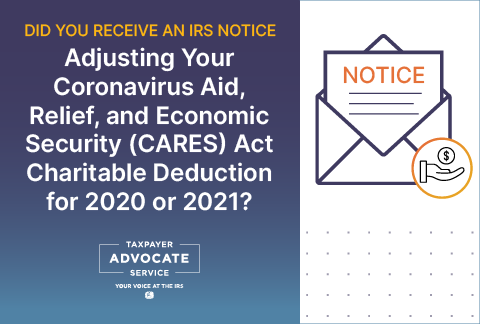The Coronavirus Aid, Relief, and Economic Security (CARES) Act enacted March 27, 2020, permits taxpayers to deduct up to 100 percent of their adjusted gross income (AGI), for qualified contributions made during calendar year 2020. The Consolidated Appropriations Act of 2021 enacted on December 27, 2020, extends these benefits for 2021.
General Information
Taxpayers who file Form 1040 Schedule A, Itemize Deductions, may claim an itemize deduction for cash contributions made to qualifying charitable organizations, subject to certain limits. These limits typically range from 20 to 60 percent of the taxpayer’s AGI and vary by the type of contribution and type of charitable organization.
How do you elect to deduct up to 100 percent of a charitable contribution as an itemized deduction on Form 1040 Schedule A?
If you are filing a paper tax return, you must make the election on Form 1040 or Form 1040SR Schedule A next to line 11. You should include your election amount on the dotted line next to the line 11 or ensure your software makes the election per the instructions on Worksheet Two of Publication 526, Charitable Contributions.
Unless you make the election as described above, the usual percentage limit applies. Keep in mind your other allowed charitable contribution deductions reduce the maximum amount allowed under this election. See Worksheet Two in Publication 526 for more information.
Did you receive an IRS notice?
If you received an IRS notice, most likely a Notice CP12, adjusting your charitable contributions for tax years 2020 or 2021.
Review a copy of your 2020 or 2021 tax return, paper or electronic copy, to see if you made the election on the dotted line next to Line 11 of the Schedule A. You should take the following action:
- If you did, follow the instructions on the Notice CP12 telling the IRS you made a proper election and provide any supporting documentation as needed.
- If you didn’t, contact the IRS at the toll-free number listed on the top right corner of your notice or respond by mail to the address on your notice. If you write to the IRS, include a copy of the notice along with your correspondence or documentation. See Did you get a notice from the IRS?
What should you do if you don’t hear from the IRS?
If you don’t receive a response from the IRS within a reasonable amount of time or are experiencing a hardship, contact the Taxpayer Advocate Service (TAS) to see if they can assist.
More information
The Volunteer Income Tax Assistance and Tax Counseling for the Elderly programs offer free basic tax return preparation to qualified individuals. Low Income Taxpayer Clinics (LITCs) are also available to assist low-income individuals who have a tax dispute with the IRS. LITCs also provide education and outreach to individuals who speak English as a second language.
TAS Resources:
IRS Resources:

